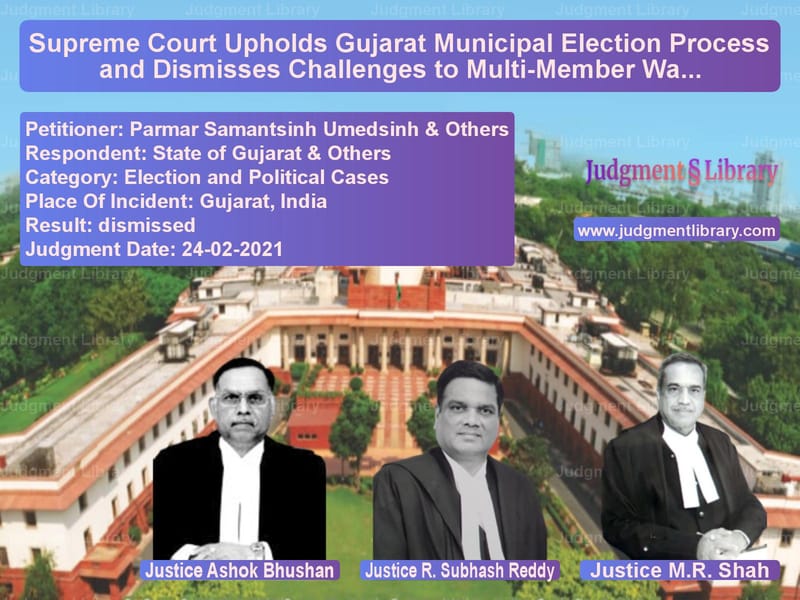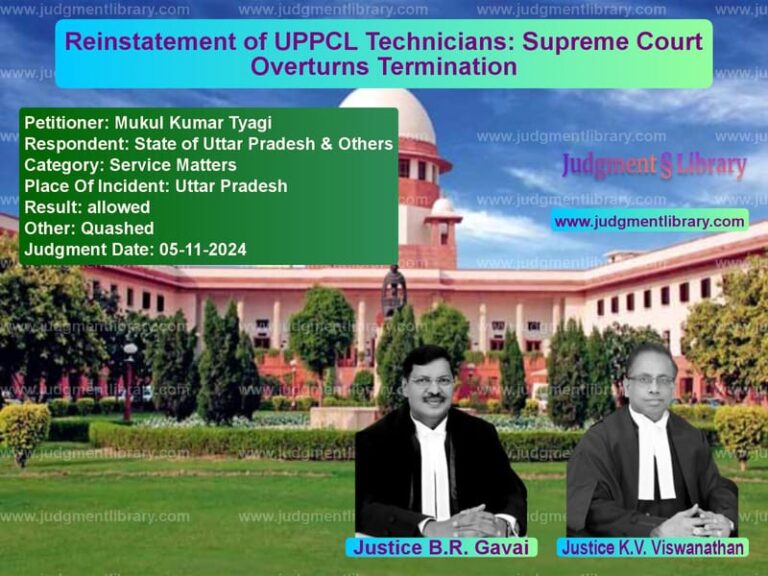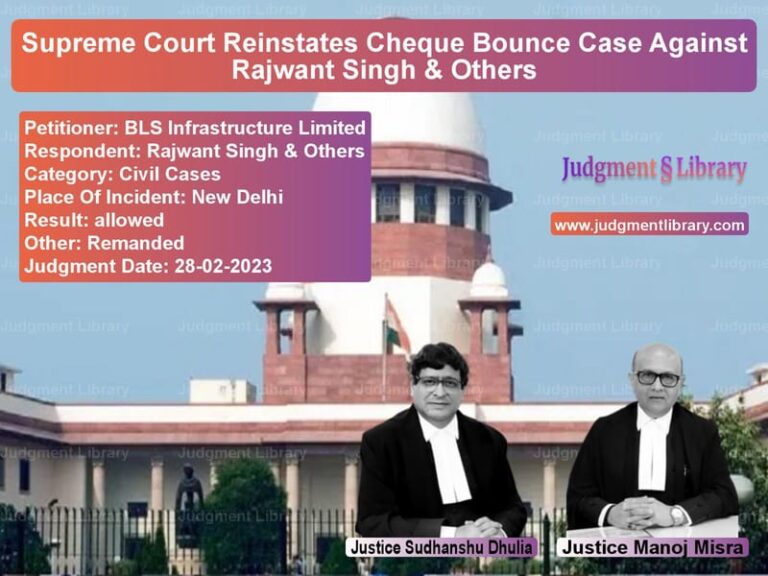Supreme Court Upholds Gujarat Municipal Election Process and Dismisses Challenges to Multi-Member Wards
The Supreme Court of India delivered a significant judgment on February 24, 2021, in the case of Parmar Samantsinh Umedsinh & Others vs. State of Gujarat & Others. The Court upheld the Gujarat municipal election process and dismissed challenges to the system of multi-member wards, ruling that there was no constitutional violation in the provisions of the Gujarat Provincial Municipal Corporations Act, 1949.
A bench comprising Ashok Bhushan, R. Subhash Reddy, and M.R. Shah ruled that the system of multi-member wards did not contravene the constitutional scheme and upheld the validity of Sections 5(3)(iii)(a) and 29A of the Act, as well as the rules governing delimitation of wards and allocation of reserved seats.
Background of the Case
Challenges to Multi-Member Wards
The primary challenge in this case concerned the provisions of the Gujarat Provincial Municipal Corporations Act, 1949, which allowed for multi-member representation from a single ward. The petitioners argued that this system violated the constitutional mandate of ‘one member per ward’ and sought to have it declared unconstitutional.
High Court’s Decision
The Gujarat High Court had previously dismissed the petition, holding that the provisions of the Act were valid. The petitioners then appealed to the Supreme Court, challenging the High Court’s ruling.
Key Legal Issues
- Whether Article 243R and Article 243S of the Constitution mandate only one representative per ward.
- Whether the provisions of the Act and the rules framed under it were ultra vires to the Constitution.
- Whether having multiple representatives from a ward undermines the empowerment of marginalized groups.
- Whether procedural lapses in the issuance of government notifications affected the validity of the municipal elections.
Supreme Court’s Observations and Ruling
Legislative Competence of the State
The Court reaffirmed that state legislatures have the authority under Entry 5 of the State List in the Seventh Schedule of the Constitution to frame laws regarding local government and municipal administration. It held that:
“The Constitution does not expressly or impliedly prohibit the election of multiple members from a single ward. The state legislature is competent to make such laws.”
Interpretation of Article 243R and Article 243S
The petitioners contended that the phrase “a member” in Article 243S(3) implied that only one representative could be elected from a ward. However, the Court ruled that this interpretation was flawed and that:
“Article 243S does not contain any restriction on the number of representatives per ward. The state legislature has the discretion to determine the mode of representation in municipal corporations.”
Empowerment of Weaker Sections
The petitioners argued that multi-member wards diluted the empowerment of women, Scheduled Castes, and Scheduled Tribes. The Court rejected this argument, stating:
“Increasing the number of reserved seats in a multi-member ward actually enhances the representation of weaker sections and ensures greater participation in local governance.”
Validity of Notifications and Rules
The petitioners also challenged the validity of government notifications related to delimitation of wards and reservation of seats. They claimed that certain notifications were issued prematurely, violating procedural requirements. The Court found no merit in this argument, ruling that:
“The issuance of notifications followed due process and did not violate any statutory or constitutional provisions.”
Final Judgment
- The Supreme Court dismissed the appeals and upheld the Gujarat High Court’s decision.
- The provisions allowing multi-member wards were found to be constitutional.
- The system of reservation for marginalized groups was upheld as enhancing empowerment.
- The election process and government notifications were ruled valid.
Key Takeaways from the Judgment
- Multi-member wards are constitutionally valid and do not violate the principle of democratic representation.
- State legislatures have broad powers to frame laws regarding municipal governance.
- Increased reservation enhances representation of weaker sections, rather than diluting their political empowerment.
- Judicial interference in electoral matters is limited unless there is a clear constitutional violation.
Impact of the Judgment
This ruling strengthens the autonomy of state legislatures in governing local municipal bodies. By upholding the system of multi-member wards, the judgment ensures that municipal representation remains flexible and inclusive. It also sets a precedent for other states considering similar electoral frameworks.
Conclusion
The Supreme Court’s decision in Parmar Samantsinh Umedsinh & Others vs. State of Gujarat & Others reinforces the legal framework for municipal elections in Gujarat. It upholds the principle that state legislatures have the authority to design electoral systems that best suit their local governance needs, provided they do not violate constitutional provisions. By dismissing the appeals, the Court has paved the way for a more inclusive and representative municipal governance system.
Petitioner Name: Parmar Samantsinh Umedsinh & Others.Respondent Name: State of Gujarat & Others.Judgment By: Justice Ashok Bhushan, Justice R. Subhash Reddy, Justice M.R. Shah.Place Of Incident: Gujarat, India.Judgment Date: 24-02-2021.
Don’t miss out on the full details! Download the complete judgment in PDF format below and gain valuable insights instantly!
Download Judgment: parmar-samantsinh-um-vs-state-of-gujarat-&-o-supreme-court-of-india-judgment-dated-24-02-2021.pdf
Directly Download Judgment: Directly download this Judgment
See all petitions in Legislative Powers
See all petitions in Public Interest Litigation
See all petitions in Judgment by Ashok Bhushan
See all petitions in Judgment by R. Subhash Reddy
See all petitions in Judgment by Mukeshkumar Rasikbhai Shah
See all petitions in dismissed
See all petitions in supreme court of India judgments February 2021
See all petitions in 2021 judgments
See all posts in Election and Political Cases Category
See all allowed petitions in Election and Political Cases Category
See all Dismissed petitions in Election and Political Cases Category
See all partially allowed petitions in Election and Political Cases Category







